Must be nice! Im sitting at 32.2 AVERAGE! Granted my commute to work has some hills and turns and of course stop and go traffic now and again. However I used a whole tank in less then a WEEK!

I fill up every week aswell, but that's not very telling in and of itself as I usually go 400+ miles on a tank. which is about your typical travel range for a car or light truck when driven to achieve near EPA fuel ratings.
Unless you have a dual fuel tank truck, then you can go forever between fill ups, pay out the a$$ when you do fillup, and probably only get 15 mpg the whole time.
My point is range and time between fill ups is secondary to average MPG because better MPG iss what's saving you money. Longer ranges are nice but it's not the factor that wil save you money.
Eg. 12 gallons of gas in a 1.4t sonic gets you 480 miles (EPA highway), 42 gallons of gas gets you 630 miles in an old dual tank F-250 (arbitrary numbers and assuming 15mpg). You can go farther and fill up less often in the F-250 but it costs you an extra $80 to go the exact same distance and $120 more to completely fill the tank (at $4.00 gas).
Feel alil better looking at it that way?

As for increasing your MPG, 2 of the biggest changes you can make is....
Slowing down a few MPH. If you normally drive 75mph try slowing down to the speed limit (or if you drive the speed limit try 5 under). It won't be long before your MPG going up. Mind you it is important to consider other drivers and conditions when doing this.
Eg. I'll cruise some highways at 40 mph but as soon as a car comes up I'll bump it up to 50mph if the roads are clear and the car is booking it or 60mph if the road is congested and passing me would be difficult.
I do similar on the interstate but only go slower than 65mph if I can get behind someone going slower.
-Minimize idling, you get 0 MPG if you're not moving. Don't start your car until you're nearly ready to take off. If you normally leave you're car running going into the convenience store, DON'T it's wasting gas. There are more extreme methods that can be used but they're usually not recommended and provide less gains.
A few more small changes you can make for noticeable gains is.....
-Accelerate gently and shift early. If you have a manual trans shift before 2,000rpm (those of us breaking 50mpg shift before/at 1,500rpm). If you have an auto be gentle enough on the gas so the trans shifts at or before 2,000rpm or use manual mode.
-Instead of hitting the brakes right before you need to stop, coast down ahead of time. If you've recently reset the DIC you can watch the improvement in MPG as you coast down.
I regulary use those techniques plus some more, and have gotten 55mpg out of a tank and seldom get worse than 40 MPG.
 I want to know if anyone on here knows what exactly he put in it to get that!? (The link is below)
I want to know if anyone on here knows what exactly he put in it to get that!? (The link is below) 
